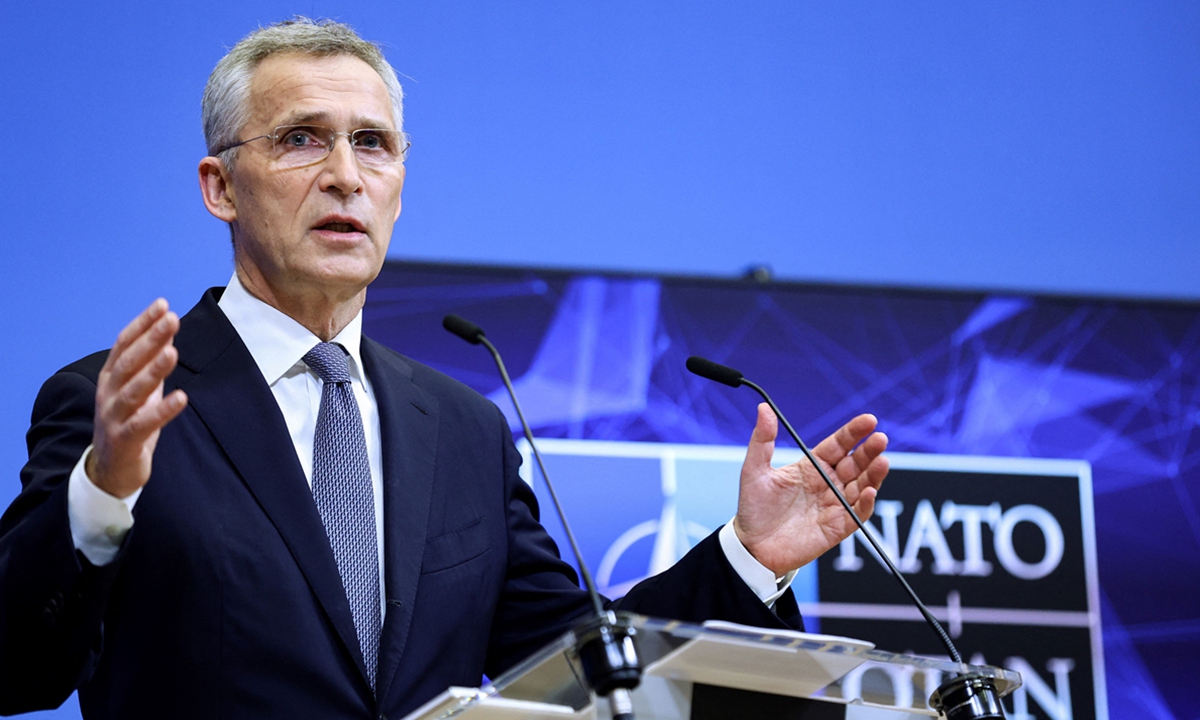
NATO Secretary General Jens Stoltenberg Photo: AFP
It's almost been a year since the Russia-Ukraine conflict started. The US-led NATO is still mired in the conflict of its own making. Nonetheless, it has already thought of another one.
At the Munich Security Conference (MSC) on Saturday, NATO Secretary-General Jens Stoltenberg peddled anxiety, linking the ongoing Russia-Ukraine conflict to China. "What is happening in Europe today," he warned, "could happen in Asia tomorrow," which many believe was a hint at concerns about a war on the Taiwan island.
Stoltenberg said what was on the US' mind. As a political henchman of the US, NATO accomplishes US' will. Also at the conference, US Vice President Kamala Harris claimed that China's support for Russia in the conflict would reward aggression. Obviously, Washington not only tries to drain out the geopolitical value of the Ukraine crisis, but also calls white black to put the blame on China. NATO and the US dance in the same tone to strengthen the so-called threat from Russia and China, in a bid to make NATO member states believe that only the US can provide them security umbrella. Hijacking the security of NATO member states has always been the aim of the US and NATO secretary-general.
The only tool a war machine sustains its life is war. Stoltenberg considers the MSC as a platform to fan the flames. Upon the one-year anniversary of the Russia-Ukraine conflict, there is no sign of easing on the battlefield. Stoltenberg indicated that the risk of an escalation of the conflict in Ukraine is incomparable with the danger that could arise in the event of a Russian victory.
Obviously, NATO finds it needless to hide its essence as the origin of war. As a product of the Cold War, it was supposed to be resting in the ash of history, but now it transfuses blood from the fear it creates on the European soil. At the same time, it is exacerbating anxiety in Asia in preparation for another war. NATO is either in a war or on the path to be in a war.
Song Zhongping, a Chinese military expert and TV commentator, told the Global Times that the US hopes NATO can extend its footprint all over the world, not just remain a transatlantic military organization. Therefore, the US has to keep hyping external threats, unite member states whose interests do not always align and make them spend more on their military budget. Just on Wednesday, US Secretary of Defense Lloyd Austin said at NATO headquarters in Brussels that NATO countries will agree to a new pledge this summer to increase defense spending above their previous target.
"US' objective is to control NATO and Europe and turn NATO into a global military alliance. The words of Stoltenberg can be seen as paving the way for NATO involvement into Asia-Pacific affairs," Song noted.
Sun Xihui, an associate research fellow with the National Institute of International Strategy at the Chinese Academy of Social Sciences, told the Global Times that Stoltenberg attempted to heighten the tense situation in Asia and cause anxiety among Japan and South Korea and even Southeast Asian countries so that they would strengthen military ties with the US and NATO. On the other hand, Stoltenberg hoped to attract international attention on the situation in Taiwan island as a means to pressure China.
But a reminder is here: the interests of the US do not equal the interests of NATO member states. Some within NATO consider Russia as a real threat, but they do not view China the same way. Meanwhile, some European countries, especially major powers like Germany and France, do not have iron-clad trust toward the US. Especially after the recent saga over the Nord Stream blast, which has deepened the distrust. Also, judging from how the Russia-Ukraine war has evolved, NATO's ability is falling short of its wish, and it will only find itself at wit's end if it extends to Asia.
"NATO keeps talking about China, which only proves that it is the execution machine of US' will. This thwarts Europe's pursuit of strategic independence, and hijacks collective defense of Europe," said Song.




